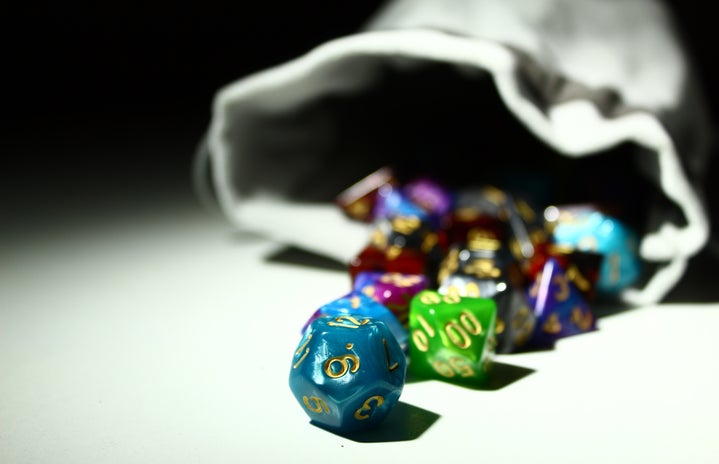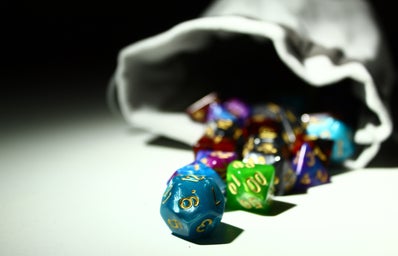Dungeons and Dragons (D&D) has often been the butt of the joke in the media. People label it as a nerdy and boring hobby despite knowing nothing about it. In addition, after the game’s creation in the 1980s, many people believed that the game was Satanic, causing a moral panic throughout American households.
However, D&D is also simply a platform for creation. It creates opportunities to create their characters and mold their fantastical world. D&D is a multimedia experience that employs writing, acting and design.
Despite the misunderstanding of what D&D is, it has played a huge part in my life and it has taught me many valuable lessons. I always get mixed reactions when I tell people I play. Regardless, D&D was a pivotal part of my high school experience and I hope to continue in college. Here are a few things I’ve learned throughout my time as a D&D player.
Think outside the box
While D&D has a negative reputation for being very rule-heavy, it gives the player a lot of freedom to create and make choices. As a D&D player, I’ve had the opportunity to create a plethora of different characters. I’ve played everything from a deadbeat gnome dad to a vampire high school student. D&D allows me to get my creative juices flowing. I also like the world-building aspect of D&D. I’ve created both tyrannical empires and cottagecore villages. D&D encourages players to utilize their imagination. It is a great activity to participate in if you are an actor, author or creator in any regard.
While the rules can sometimes be tricky to learn, D&D encourages “homebrewing,” which is when you create something not originally in the D&D game. This can be anything from a civilization, a spell or a character type. For me, I wanted to play a vampire but in traditional D&D, vampires are monsters, not characters. I worked with my dungeon master, the leader of the game, to make a vampire character. I gave my character abilities like night vision and shapeshifting into a bat. But, I also gave him weaknesses like sunlight exposure and an allergy to garlic. As you can see, there is no limit to what you can create in D&D!
Teamwork makes the dream work
Collaboration is essential in D&D, both in and outside of the game. In-game, forming relationships with other characters is vital to survival. In D&D, there are different classes. A few examples include wizard, cleric and rogue. Each class comes with different abilities and combining different characters’ strengths is pivotal in furthering gameplay and defending yourself from any monstrous villains you might encounter.
Outside of formal gameplay, members of your campaign are a great support system. Members can give you ideas for your character and help develop a unique story. In my experience, members of my campaigns typically become close friends of mine. D&D is a team sport. It takes all members to make a fun and exciting game.
No task is too big
D&D can be a lot of work. Worldbuilding can take a long time, especially if you’re looking to create a realistic society and world. In addition, battles often require a lot of math, dice rolling and tricky decision-making. However, the work players put in makes the gameplay more enjoyable. It is satisfying to work on something and watch work come to fruition. While some ideas might seem too “big” or “complex,” dungeon masters (DM’s), who serve as the “leader of the games,” are often very understanding and want to incorporate your ideas into gameplay. They also usually want to help you with the process. D&D has taught me that any idea is possible. Even if it seems unrealistic, there is always a way to make my ideas a reality. I just might need a little help or a few tweaks along the way.
Wanna get started?
If you’re a fellow creative and want to play D&D, there are many ways to start. Many college campuses have clubs for tabletop, role-playing games. To get started, you’ll probably want to create a character. D&D Beyond is a great resource for first-time players. It can help you organize stats for your character and keep all your information in one place. Character sheets can be tricky to fill out for first-time players, so let D&D Beyond take some of that weight off your shoulders!
Once you’ve created a character, you can start looking for a campaign to join. A campaign is a game in D&D. Campaigns consist of a dungeon master and other players. Some campaigns have themes, whereas others might follow the more traditional D&D gameplay. You can find a good campaign for your character or find a campaign and then create your character. There is no right way to do it.
When playing, remember that you have to become your character. You have to talk like your character and make decisions like your character would. Some people employ certain accents to make their characters more realistic. Characters often adhere to specific moral alignments. These alignments help players think more like their character and separate their wishes and agenda from that of their character.
In terms of gameplay, you don’t necessarily need to buy a dice set or a figurine for your character. While those things are great, they are not always necessary for gameplay. You can roll a D20 or any other dice on your laptop or “D&D Beyond.” In addition, if you don’t have a figurine, a placeholder like a coin or button can work. You don’t need to stress about buying a bunch of stuff to play D&D. All you need is your sense of imagination.
If you’re interested in buying a set of dice, Barnes & Noble has a wide selection of D&D dice sets. I use a pair of pink, sparkly dice. Some people like to match their dice to their character. There are also tons of online shops on Etsy with even more options. Hero Forge is great for making personalized figurines of your character.
Ultimately, D&D is a multimedia and diverse game. No two D&D campaigns are alike, but they are all universal because they can foster creativity and community. I am so glad to be a D&D player because it has taught me many valuable lessons and how to break out of my shell. Playing D&D is an engaging and thrilling experience that everyone should try!


